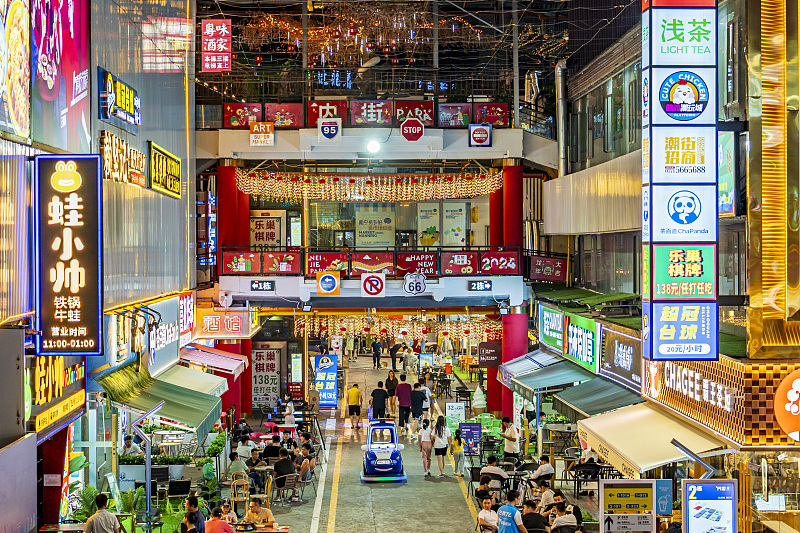No power can destroy the Chinese dream


Leaders in Europe and the United States, multinational corporations and international institutions are studying the resolution of the third plenary session of the 20th Central Committee of the Communist Party of China to get an idea about China's new reform path, because it will influence the global economy.
The third plenary session, which concluded on July 18, ushered in a new period of reform, opening-up and socialist modernization. "It marked the start of a new journey of comprehensively deepening reform in the new era with systematic and holistic plans" to advance Chinese modernization and realize national rejuvenation, as well as achieve high-quality development and improve people's livelihoods.
The effects of this phase of Chinese modernization will also spill over to the Belt and Road Initiative, Global Development Initiative, Global Security Initiative and the Global Civilization Initiative.
Despite some economists and other experts claiming that China's economic growth has already peaked and may not grow further, the Chinese economy has continued to grow since the third plenary session of the 11th CPC Central Committee in 1978 which signaled the launch of reform and opening-up. China's economic growth would not have continued for so long if its development model was not upgraded to adapt to the changing domestic and global situations.
How does the world react to China's new transformative path toward building an innovative, green and smart society through further advancement of its forces in green technologies, AI, and semiconductors which are crucial for every country's growth and favourable positioning in the global economy?
China's investments in Hungary can be seen as part of China's "shared development" praxis in high-quality manufacturing. At the end of last year, BYD announced it would build an electric vehicle (EV) manufacturing factory in Hungary to consolidate its presence in the European Union and ensure its EVs conform to the EU's standards. In July, BYD signed an agreement with Turkiye to establish an EV plant there to realize the same goal.
Recently, Italy and China, which already are comprehensive strategic partners, signed a three-year action plan to deepen cooperation in sectors such as technology, infrastructure and green energy, bucking the trends of "de-globalization", "decoupling" and protectionism.
Italy sees China's breakthroughs in high-tech as an opportunity for Italian industries and enterprises to upgrade their technologies and engage in high-quality economic cooperation with their Chinese counterparts. Perhaps the same thinking prompted Stellantis, a multinational automobile manufacturing corporation formed in 2021 through the merger of Italian-American conglomerate Fiat Chrysler Automobiles and the French PSA Group, to enter into a joint venture with Leapmotor, a Hangzhou-based company specializing in developing EVs, three months ago.
By deepening bilateral and multinational cooperation with other economies in green technologies and products, Italy can set an example for other EU member states that plan to accelerate their green transition.
Equally important, according to official data, Germany's investment in China grew by 18.1 percent in the first six months of this year, indicating confidence that the Chinese economy will continue to grow. In fact, more and more foreign direct investment is flowing into China's hi-tech manufacturing sector, which will help China realize reform goals.
European countries' deepening cooperation with China to develop high-quality products and services is in total contrast to some other Western countries resorting to protectionism, imposing sanctions, engaging in geopolitical competition and announcing plans and initiatives similar to those that China has already launched to play zero-sum games.
Strengthening cooperation with China in high-quality products and services requires a new way of thinking and being open to new forms of cooperation like those that China has already presented, described and implemented "shared development" in its global initiatives.
The EU may face more severe development problems than it has in the past five years if it continues to serve the US' strategic and economic interests, especially by increasing NATO's budget and intensifying its geopolitical activities, because the allocation of more funds to NATO will increase its financial problems. According to NATO data, the defense budgets of NATO members in Europe, and Canada, increased by nearly 18 percent this year alone, the highest in decades.
The US has spent the past seven years spreading falsehoods about China's growth, projecting it as a threat to the West, which unfortunately have influenced the EU's leadership. The whole world will suffer if the US continues to curb China's rise.
However, the Joe Biden administration has made clear its intention of further curbing China's rise and isolating it from the international trade by restricting the export of some high-tech products, especially advanced semiconductors, to China. In fact, the US has taken many more measures, including imposing sanctions on Chinese entities, to suppress China globally.
But Chinese companies are already designing advanced chips to offset the impacts of the Biden administration's decision, while the Chinese government is advancing the country's global initiatives to promote shared development and uphold multipolarism. And countries around the world, whether they be US allies or not, admire China for its resilience and progress.
Moreover, the US tried to persuade and/or coerce many countries to not join the Belt and Road Initiative, but it didn't succeed in its design. This reminds me of what former Croatian president Stjepan Mesic likes to say: no one has the power to destroy the Chinese dream.
The author is president of the Geoeconomic Forum Croatia. The views don't necessarily reflect those of China Daily.
If you have a specific expertise, or would like to share your thought about our stories, then send us your writings at opinion@chinadaily.com.cn, and comment@chinadaily.com.cn.


































